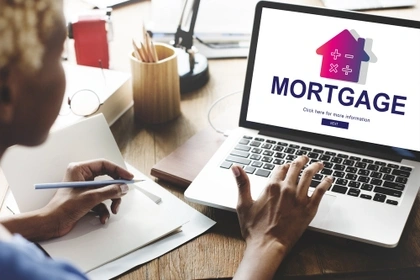How does a fixed rate mortgage work?
The two main mortgage types are:
- Fixed rate mortgage
- Variable mortgage
With both types of mortgage, you borrow funds to purchase a property, then pay back the balance (with interest) over a set term.
A fixed rate mortgage offers you security in terms of fixing the interest rate (and your monthly repayments) for an agreed period.
You can fix your mortgage rate for two, three, five or ten years, depending on your individual circumstances. While longer fixed terms can offer peace of mind, they tend to come with higher rates.
Bear in mind, there are other circumstances where the amount you pay can change, for example, if you miss a payment and a late fee is applied.
Fixed vs variable mortgage
Unlike a fixed rate mortgage, the interest rate you pay on a variable mortgage will fluctuate. So, some months you may end up paying more than you thought - and others you may pay less.
Read on to find out about the different types of variable mortgage available.
Should I fix my mortgage?
Whether or not you should fix your mortgage depends on your priorities and individual circumstances.
Fixed rate mortgages are a great option for those looking to have peace of mind when it comes to their monthly repayments. You know exactly how much you’ll be paying every month for a fixed period, which makes budgeting easier and offers a sense of security. However, this comes at the price of some flexibility.
Fixed rate mortgages lock you in for a fixed term, so if you want to switch, you’ll likely face early repayment charges. They might also come with higher interest rates, particularly if you’re looking to fix the rate for a longer term.
Variable mortgages generally offer more flexibility (as you’re not locked into a fixed rate term) and don’t normally have early repayment charges.
You may also end up paying less interest on a variable mortgage – because if interest rates drop, your monthly payments will too, and you’ll pay less overall. However, there is risk involved because interest rates may rise instead.
With all of this in mind, consider asking yourself some of these questions to help you establish which type of mortgage would be more suitable to your circumstances:
- what’s more important to you, flexibility or set monthly repayments?
- could you still afford the repayments if interest rates go up?
- will you be looking to move before the fixed rate term ends?
- are you able to pay any potential early repayment charges if you do want to move or remortgage before the deal ends?
How long should I fix my mortgage for?
If you've weighed up your options and decided to get a fixed mortgage, you need to consider how long you should fix it for. This largely depends on your individual circumstances and how much risk you are willing to take.
For instance, if you’re willing to commit to your mortgage (and property) for longer, then a five or 10-year fix can offer you more peace of mind. However these deals do tend to be more expensive and come with higher early repayment charges and upfront fees.
Is it worth fixing a mortgage for 5 years?
Here’s a quick run through the pros and cons of getting a 5-year fixed rate mortgage:
|
Pros |
Cons |
|
Your rate is protected for longer, which can give you more peace of mind |
You’re locked into your mortgage and will face early repayment charges if you want to switch before the deal ends |
|
You won’t have to shop around for another deal for at least five years |
Your interest rate is likely to be more expensive than if you opt for a shorter fixed term |
|
Longer term financial planning will be easier |
If your house value goes up and your loan to value works in your favour, you won’t see a reduction in your interest rates until after the 5 years is up |
What happens when my fixed rate mortgage ends?
At the end of the fixed rate term of your fixed rate mortgage, you’ll be transferred on to the lenders’ standard variable rate (SVR). This tends to be higher than the interest rate you were on before, so at this point you may wish to look at switching.
Beware that some lenders have a ‘tie-in period’ for their fixed rate mortgages that requires you to remain on the lenders’ SVR for a specified amount of time - before you can switch without having to pay an early repayment charge.
Can you extend a fixed rate mortgage?
You can’t extend your fixed period, but you can get a new fixed deal with your current lender when your current deal ends. While it’s probably easier to stick with the same lender, it may be cheaper to switch if you can find a better deal elsewhere.
Can you change mortgage before the fixed term ends?
You can switch your mortgage before the fixed term ends - this is known as remortgaging. When you remortgage, you repay your current mortgage in full by taking out a new one - either with the same lender or a different one. You’re essentially paying off your mortgage and switching to a new deal. This could be because you have found a cheaper mortgage with lower interest rates, for example.
However, most lenders apply early repayment charges to compensate for the loss of interest they’ll face if you switch. So, it’s important to take this into account when calculating the cost vs savings of changing mortgage before the fixed term ends.
Can you switch mortgage after the fixed period ends?
You can remortgage after your fixed period ends (but be sure to check if you have a tie-in period as we mentioned above). It’s common for people to switch mortgages to a better deal after the end of their fixed term, and it can often work out cheaper to do so.
Can you move house on a fixed rate mortgage?
You can sell your house and move house if you’re still in the fixed term of your mortgage, but you’ll probably have to pay early repayment charges as mentioned above. If you’re out of the fixed term then you can either port your mortgage (providing it’s portable) - or take out a new one for your new property.
Remortgage to reduce your outgoings by £100s per month
- We compare 100s of mortgage deals
- Get FREE no obligation, expert advice
- Get extra cash for other purposes
Mortgages are secured against your property. This means your home may be at risk if you fall behind with your mortgage repayments.
Note, the more you borrow and the longer your mortgage term, the more interest you'll pay in total.
Disclaimer: We make every effort to ensure content is correct when published. Information on this website doesn't constitute financial advice, and we aren't responsible for the content of any external sites.






